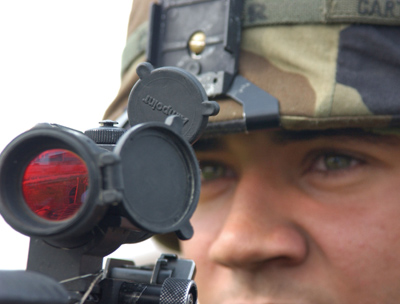Imagine this: Youre a prescription sunglass-wearing soldier patrolling the sun-bleached streets of a foreign city when you hear gunfire and screaming coming from a nearby building. Upon entering the building, you remove your sunglasses because the building is dimly lit. In the midst of replacing them with your regular glasses, you notice a fuzzy figure running toward you aiming a gun. The figure is too close for you to ask for identification, so you shoot to protect yourself. Once you put your glasses on, however, you see that youve actually killed one of your comrades.
 |
| SuperVision lenses will enable up to 20/8 vision through rifle sights, goggles and visors for military purposes. Then whats next? SuperVision lenses for presbyopia. |
The technology is SuperVision, and the U.S. Department of Defense has given the company that created it, PixelOptics, of Roanoke, Va., a $3.5 million grant to develop what it calls dynamic (changing optical power) optics. These intelligent lenses will adjust to the wearers environment in milliseconds, without any moving parts, to remedy previously uncorrectable higher-order aberrations and enable up to 20/8 vision through rifle sights, goggles, visors and more, PixelOptics says. This will be achieved using a proprietary combination of chemistry, electricity and other components, such as a microchip.
Depending upon the available light around you, whether its inside or outside, your aberration changes. If you go to Mile High Stadium in Denver, your aberration changes, believe it or not, because of the altitude, says PixelOptics President and CEO Ronald D. Blum, O.D. Also, every time you blink and the tears go across your cornea, your aberration changes. Our [PixelOptics] technology dynamically corrects for these aberration changes in real time as they occur. PixelOptics has a timeline for developing this technology, though Dr. Blum would not elaborate.
What does this technology mean for your practice and your patients? The company also is developing SuperVision optics for the general public to remedy visual disorders such as presbyopia.

